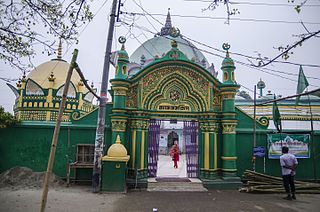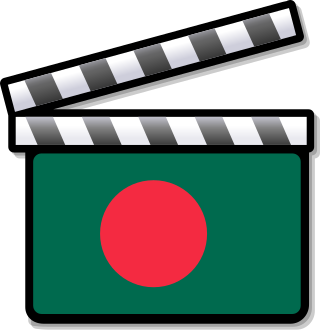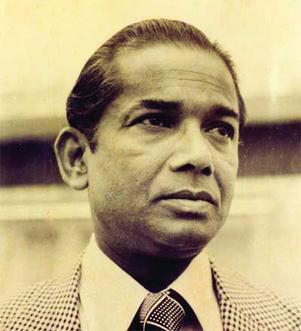Related Research Articles

Sirajganj District is a district in the North Bengal region of Bangladesh, located in the Rajshahi Division. It is the 25th largest district by area and 9th largest district by population in Bangladesh. It is known as the gateway to North Bengal.
Mohammad Zahirullah, known as Zahir Raihan, was a Bangladeshi novelist, writer and filmmaker. He is most notable for his documentary Stop Genocide (1971), made during the Bangladesh Liberation War. He was posthumously awarded Ekushey Padak in 1977 and Independence Day Award in 1992 by the Government of Bangladesh.
Fazle Lohani was a Bangladeshi journalist, television host, songwriter and film producer. He was best known for his popular Bengali-language TV news magazine show Jodi Kichhu Mone Na Koren, which aired on Bangladesh Television from 1977 to 1985, he has been stated as the forerunner of quality TV programmes.

The Cinema of Bangladesh, also known as Bangla cinema, is a diverse and vibrant entity, consisting of films produced across various regions in Bangladesh, each contributing its unique linguistic and cultural perspective. Beyond the dominant Dhaka based Bengali-language film industry Dhallywood, which is a portmanteau of "Dhaka" and "Hollywood", Bangladesh is home to cinema in several other languages and dialects. For instance, Chakma cinema from Bandarban, Garo cinema from Sherpur, Meitei and Sylheti cinema from Sylhet, Chatgaiya cinema from Chattogram. These regional cinemas play a crucial role in preserving and promoting the linguistic and cultural heritage of the country. The dominant style of Bangladeshi cinema is melodramatic cinema, which developed from 1947 to 1990 and characterizes most films to this day. Cinema was introduced in Bangladesh in 1898 by the Bradford Bioscope Company, credited to have arranged the first film release in Bangladesh. Between 1913 and 1914, the first production company, Picture House, was opened. A 1928 short silent film titled Sukumari was the first Bengali-produced film in the region. The first full-length film, The Last Kiss, was released in 1931.

Barishal Zilla School, popularly known as BZS, is a public educational institution for boys, located in Barisal, Bangladesh. It was the first high school established in Barisal Division. Founded as Barisal English School on 23 December 1829 by W. N. Garrett, it began with 27 students. In 1853, the school was renamed Barisal Zilla School.

Khan Ataur Rahman was a Bangladeshi film actor, director, producer, screenplay writer, music composer, and singer, best known for his role in the film Jibon Theke Neya (1970). He received the Bangladesh National Film Award for Best Screenplay for the films Sujon Sokhi (1975) and Danpite Chhele (1980). He was awarded Ekushey Padak posthumously in 2003 by the Government of Bangladesh.

Subhash Dutta was a Bangladeshi filmmaker, theater and film actor. He started his career as a commercial artist.

Anwar Hossain was a Bangladeshi actor, best known for playing the role of Siraj ud-Daulah in the Bengali film Nawab Sirajuddaula (1967). He appeared in nearly 500 movies in his 50-year career. He is often referred as The Uncrowned Nawab of Bengali films. He received the Bangladesh National Film Award for Best Actor for his role in the film Lathial (1975) and Best Supporting Actor awards for the films again for Golapi Ekhon Traine (1978) and Dayi Ke? (1987).

Gazi Mazharul Anwar was a Bangladeshi film director, producer, lyricist, screenwriter and music director. He earned the Bangladesh National Film Award for Best Lyricist a record seven times for the films Tit for Tat (1992), Ajante (1996), Churiwala (2001), Lal Dariya (2002), Kokhono Megh Kokhono Brishti (2003), Meyeti Ekhon Kothay Jabe (2016) and Joiboti Konyar Mon (2021). He worked as a lyricist in the "Swadhin Bangla Betar Kendra". He was awarded Ekushey Padak in 2002 and Independence Day Award in 2021 by the government of Bangladesh. He has penned lyrics for 267 films.

Khalil Ullah Khan was a Bangladeshi film and television actor. He earned Bangladesh National Film Award for Best Supporting Actor for his role in Gunda in 1976.

Government College of Applied Human Science is a government college formerly known as the College of Home Economics.
Ehtesham ur Rahman, known as Captain Ehtesham, was a Bangladeshi and Pakistani film director. On his death in 2002 he was described as a pioneer of the film industry in Dhaka, and one of Bangladesh's leading directors.
Husna Banu Khanam was a Bangladeshi educationist, writer and Nazrul singer. She was a pioneer of Bengali Muslim women journalism. In 1999, she received the Ekushey Padak Award for her contribution in music, and in 2004, she received the Begum Rokeya Medal for her contribution to the socio-economic development of women by the Government of Bangladesh.
Kazi Khalek (1915–1970) was a Bangladeshi film actor. He is known for his outstanding contribution to development of the film industry in Dhaka. In 1958, he entered the film industry starring in the film Asiya, directed by Fateh Lohani. The first movie released by him in Dhaka was Jago Hua Severa, directed by AJ Karadar. In his acting career, he played in 28 films. His notable films include Tomar Amar, Surja Snan, Sonar Kajol, Dharapat, Nadi o Nari, Bhawal Sanyasi, Chaoya Paoya, Nayantara, Natun Diganta, Etotuku Asha, Ballobandhu, Aban Chhita and Je Agune Puri.

Aseeya is a Pakistani Bengali drama film that was released in 1960. The film was produced and directed by Fateh Lohani. Story and dialogue by Nazir Hossain and also screenplay by Fateh Lohani. The film was produced in the banner of Purbani Chitro and produced by Pakistan Film Institute. Sumita Devi starred in the main role and Shaheed, Kazi Khalek, Prabir Kumar, Bhavesh Mukherjee also played in the supporting role.
AFM Abdul Ali Lalu was a Bangladeshi film and television actor mostly in a comedic role. He was notable for his on-screen catchphrase "Koinchhen Dehi" in the television show Jodi Kichu Mone Na Koren, hosted by Fazle Lohani. He acted in more than 100 films.
References
Footnotes
- 1 2 3 4 5 6 7 8 9 10 11 12 13 14 15 16 17 18 19 20 21 22 23 24 25 26 27 28 29 30 31 32 33 Hayat 2012
- 1 2 "Remembering Fazle Lohani". Dhaka Tribune. 2016-10-29. Retrieved 2018-09-21.
- ↑ "Fazle Lohani | The Asian Age Online, Bangladesh". The Asian Age. Retrieved 2024-04-01.
- ↑ "Iconic filmmaker and musician". The Daily Star. 2014-12-11. Retrieved 2018-09-21.
- ↑ "Razia Lohani passes away". The Daily Star. 27 February 2022. Retrieved 26 February 2022.
- ↑ Raju 2014, p. 109
- ↑ Gazdar 1997, p. 254
- ↑ Gazdar 1997, p. 257
- ↑ Gazdar 1997, p. 259
- 1 2 3 4 5 6 Gazdar 1997, p. 262
- ↑ Gazdar 1997, p. 265
- ↑ Gazdar 1997, p. 266
- ↑ Gazdar 1997, p. 268
- ↑ Gazdar 1997 , p. 248
- ↑ Gazdar 1997 , p. 249
- ↑ Gazdar 1997 , p. 255
Bibliography
- Gazdar, Mushtaq (1997). Pakistan Cinema, 1947-1997. Oxford University Press. ISBN 0-19-577817-0.
- Hayat, Anupam (2012). "Lohani, Fateh". In Islam, Sirajul; Jamal, Ahmed A. (eds.). Banglapedia: National Encyclopedia of Bangladesh (Second ed.). Asiatic Society of Bangladesh.
- Raju, Zakir Hossain (2014) [First published 2008]. Bangladesh Cinema and National Identity: In Search of the Modern?. Routledge. ISBN 978-1-317-60180-7.